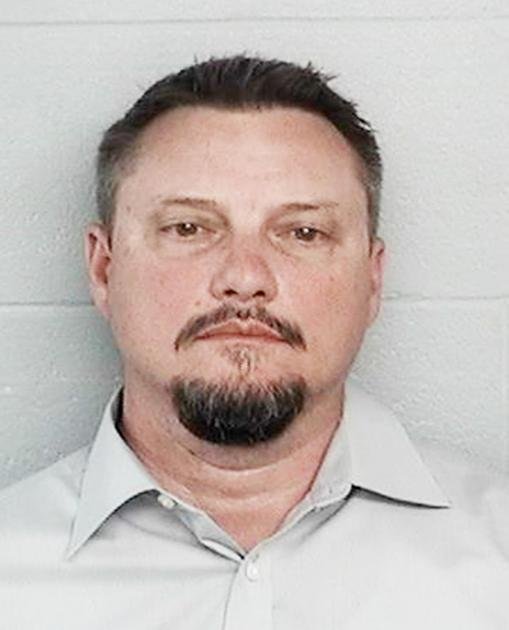
The Black Collar Crime Series relies on public news stories and publicly available information for its content. If any incorrect information is found, please contact Bruce Gerencser. Nothing in this post should be construed as an accusation of guilt. Those accused of crimes are innocent until proven guilty.
In 2019, David Beckner, a former teacher at Gaylord Grace Baptist Christian School in Gaylord, Michigan, was arrested and charged with sexually abusing a female student. The Gaylord Herald Times reported at the time:
David Beckner, 51, of West Virginia was arraigned Thursday afternoon in 87th District Court on eight criminal sexual conduct charges for allegedly abusing a teen girl in 2006 and 2007 in Otsego County.
Brendan Curran, Otsego County prosecutor, said the official complaint by Michigan State Police was filed June 13 for sex offenses committed upon a teen in Otsego County.
“I have charged David Wayne Beckner (presently residing in West Virginia) with seven counts of CSC 3rd degree and one count of CSC 4th degree, for seven sexual penetrations and one touching of a minor child who was a student of Beckner’s at the time their relationship began,” Curran said in an email.
According to a Michigan State Police news release Thursday evening, Beckner resides in Morgantown, West Virginia, and turned himself in Thursday. The release also said Beckner worked for the Grace Baptist Church from September 2004 until June 2007 before moving out of state.
….
Brianna Kenyon, a former Grace Baptist student, alleges that Beckner abused her as a minor and has publicly shared her story.
“When I grew up in that church, we’re all so isolated from the real world that I always thought I was the only one in the world, let alone in my church, that had ever had anything sexual happen to them. I was so alone for years and years; it wasn’t until I was (into adulthood) that I realized it actually happens a lot.”
Kenyon, 29, said she reported Beckner years ago for criminal sexual conduct to police and to the school’s pastor, Jon Jenkins, in 2011.
In an email, Jenkins said, it would be “a favorable outcome if justice can be achieved for Brianna.” He said, “Grace Baptist Church has always, and continues to stand in favor of justice for the victim.”
Previous Herald Times Freedom of Information Act requests returned no reports from the pastor or church to police of the alleged abuse.
Kenyon said the prosecutor at that time opted to not pursue the case and it was dropped.
….
Early this year, Ruthy Nordgren, now an adult, shared her story with the Herald Times and others publicly.
Nordgren is also a former Grace Baptist student and teacher Aaron Willand was convicted in 2016 of abusing her in Washington state.Nordgren said she is also pursuing charges in Otsego County for abuse that she said happened when she was a student.
“And when Ruthy messaged me (about sharing publicly in the news), I thought, what could it hurt,” Kenyon said. “I couldn’t really get any justice for myself, and I figured if someone could be helped by my story and (they can see) here’s a girl that survived, and I do live a normal life and I do treat others well and I didn’t use this as a reason to be another monster.”
Grace Baptist Church is an Independent Fundamentalist Baptist (IFB) congregation.
According to the Gaylord Herald Times:
Beckner joins the growing list of people with ties to Grace Baptist Church and school who have been convicted or accused of sexually abusing minors in the last 17 years. Another teacher, a bus driver, youth conference guest speaker and former congregation members are among those already convicted or facing criminal sexual conduct charges.
Despite all of this, Jon Jenkins remains the pastor of Grace Baptist. Last May, Jenkins celebrated his thirty-third anniversary at the church. He has “much” to be grateful for. (That’s sarcasm, by the way.)
Since the original story on David Beckner, Beckner has pleaded guilty and was sentenced to 10-15 years in prison.
9&10 News reports:
David Beckner was sentenced to 10 to 15 years behind bars for the third-degree sex crimes.
State police say it happened in 2006 while the victim was a 16- or 17-year-old student at Grace Baptist in Gaylord.
State police initially investigated the case in 2013, but the former Otsego County prosecutor did not file charges.
According to the Otsego County Prosecutor’s Office, David Beckner, 51, of Morgantown, had previously pleaded guilty to three of seven charges of sexual misconduct against a girl whom Beckner had contact with while she was his student.
Despite the charges coming from Michigan, Beckner was allowed to remain in his Morgantown home during the trial process on “liberty at bond” due to “medical issues,” rather than being remanded to Michigan, according to the prosecutor’s office.
….
During the sentencing, the victim in Beckner’s case took time to speak, and the judge took her words into consideration when he made his sentencing decision. The prosecutor’s office said the charges Beckner received usually bring a 5-year minimum sentence, but Judge George J. Metz gave Beckner a 10-year minimum sentence, instead.
After giving the sentence, Metz said, “There are various reasons for prison sentences: punishment, deterrence, protection of society and rehabilitation. In this case, only the first three apply,” according to the prosecutor’s office.
And Jon Jenkins? Well, he packed up his roadshow and moved to North Carolina to become the new pastor of Fellowship Baptist Church in Clayton. If you are unfamiliar with what has gone on at Grace Baptist under Jon Jenkins’ watch, please read the Aaron Willand story.
Bruce Gerencser, 66, lives in rural Northwest Ohio with his wife of 45 years. He and his wife have six grown children and thirteen grandchildren. Bruce pastored Evangelical churches for twenty-five years in Ohio, Texas, and Michigan. Bruce left the ministry in 2005, and in 2008 he left Christianity. Bruce is now a humanist and an atheist.
Connect with me on social media:
Your comments are welcome and appreciated. All first-time comments are moderated. Please read the commenting rules before commenting.
You can email Bruce via the Contact Form.










